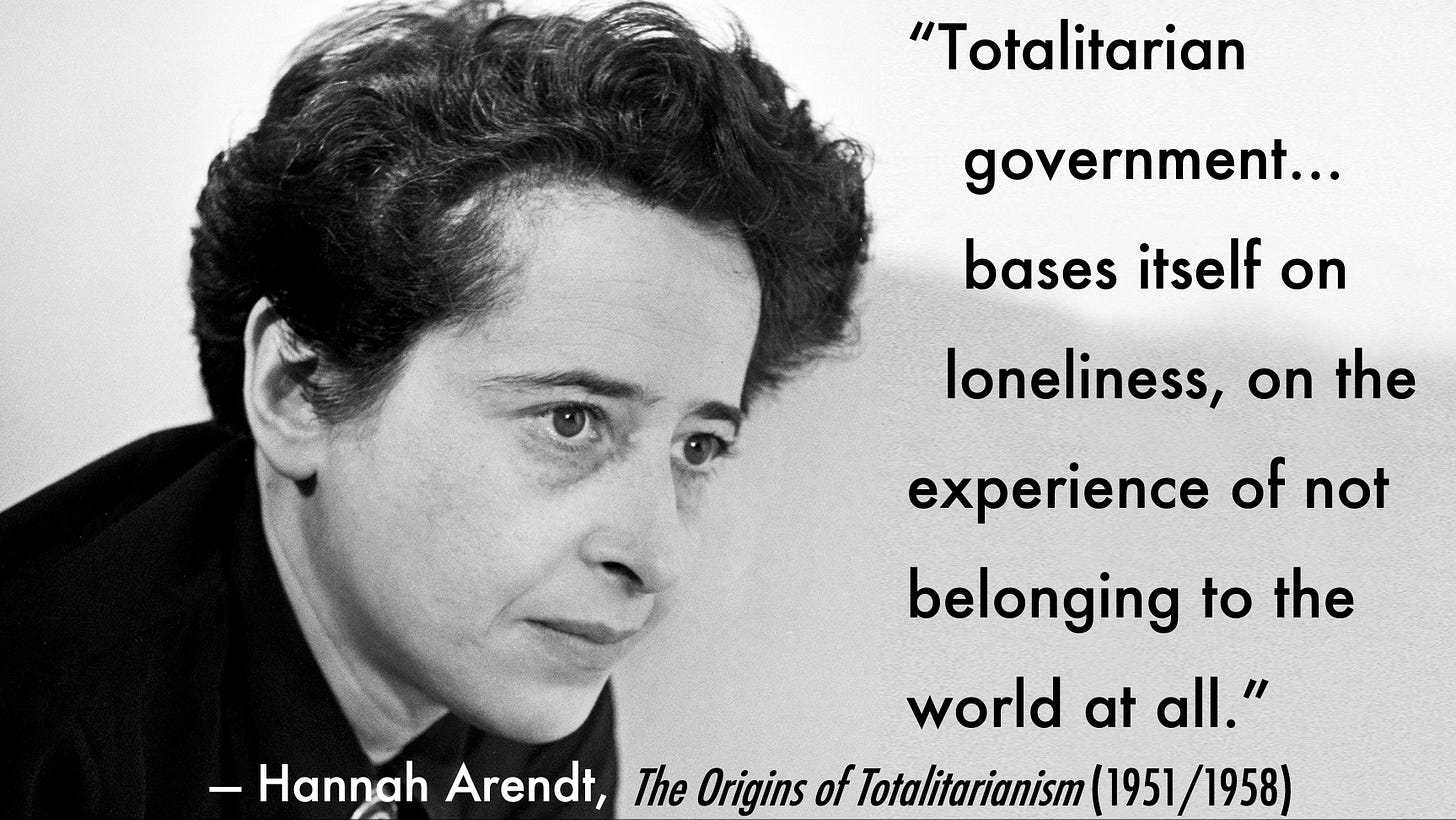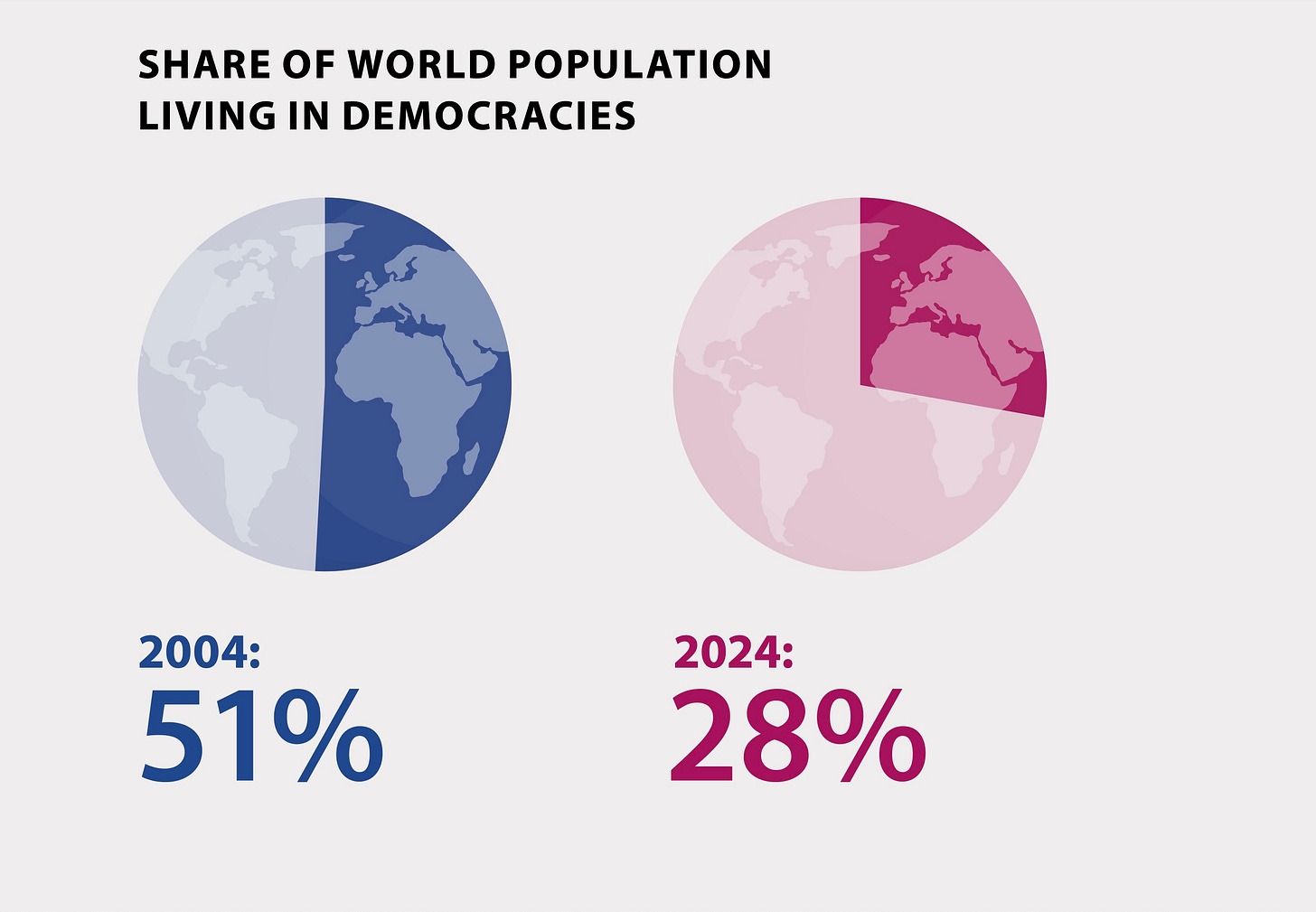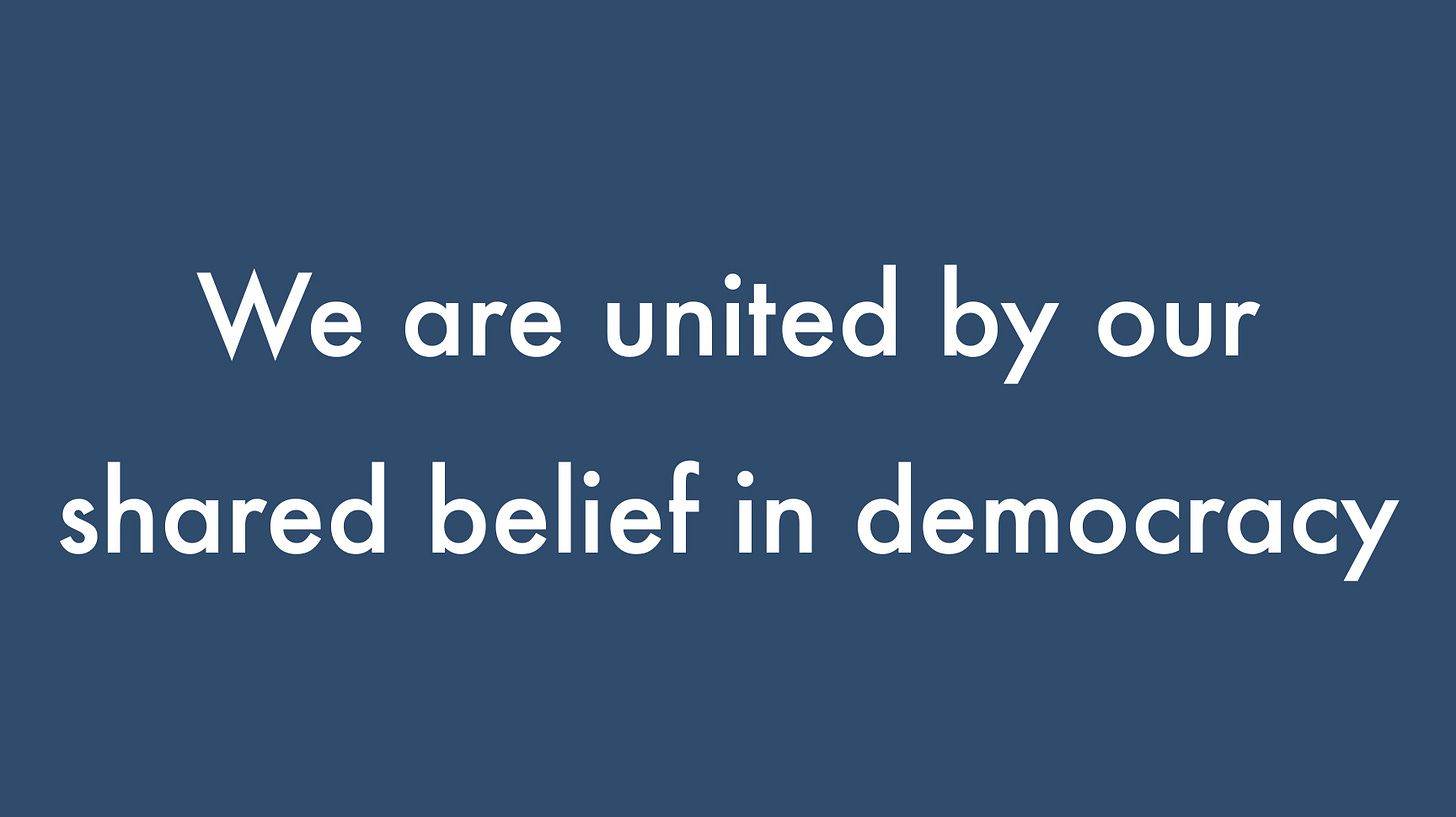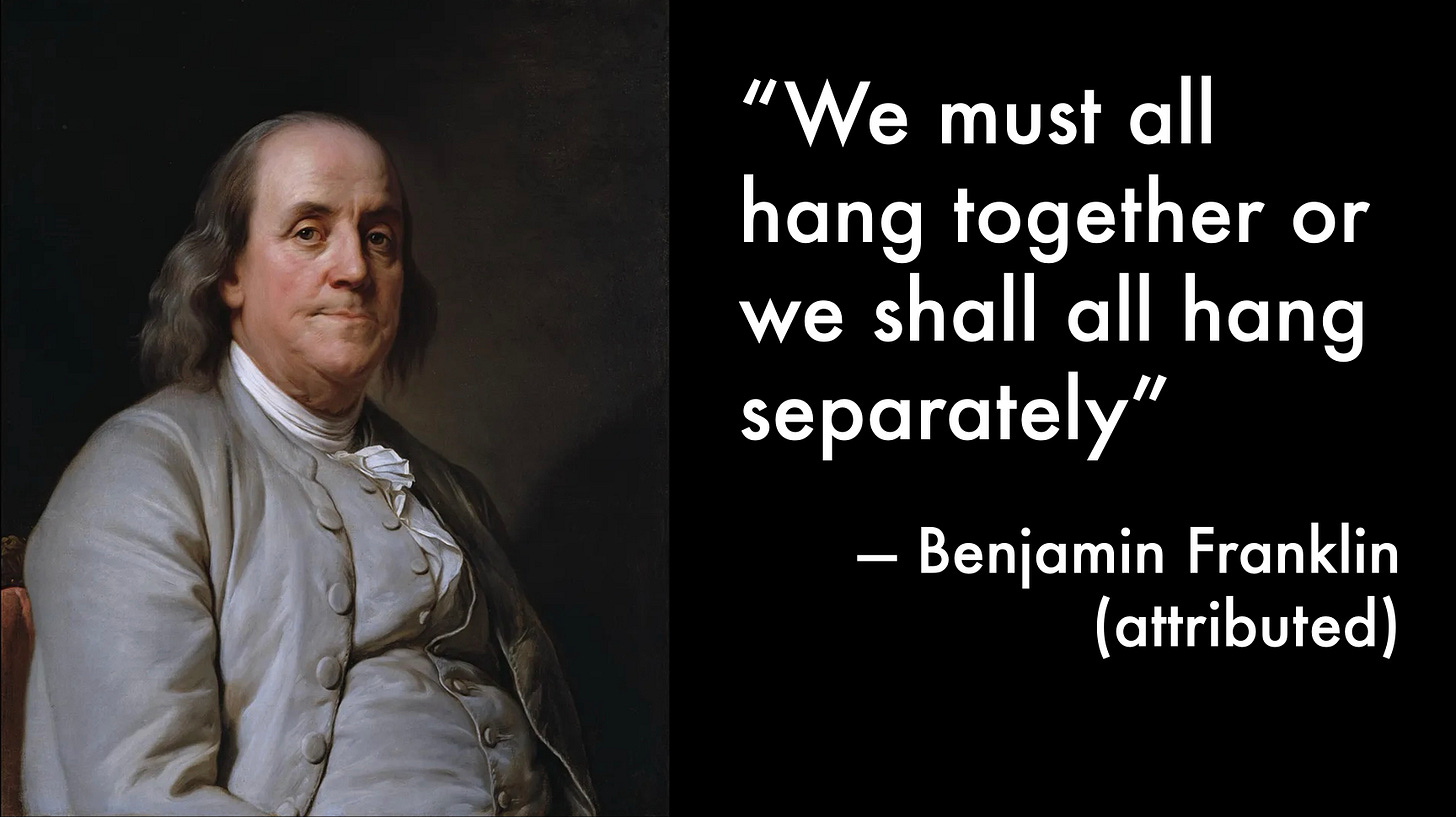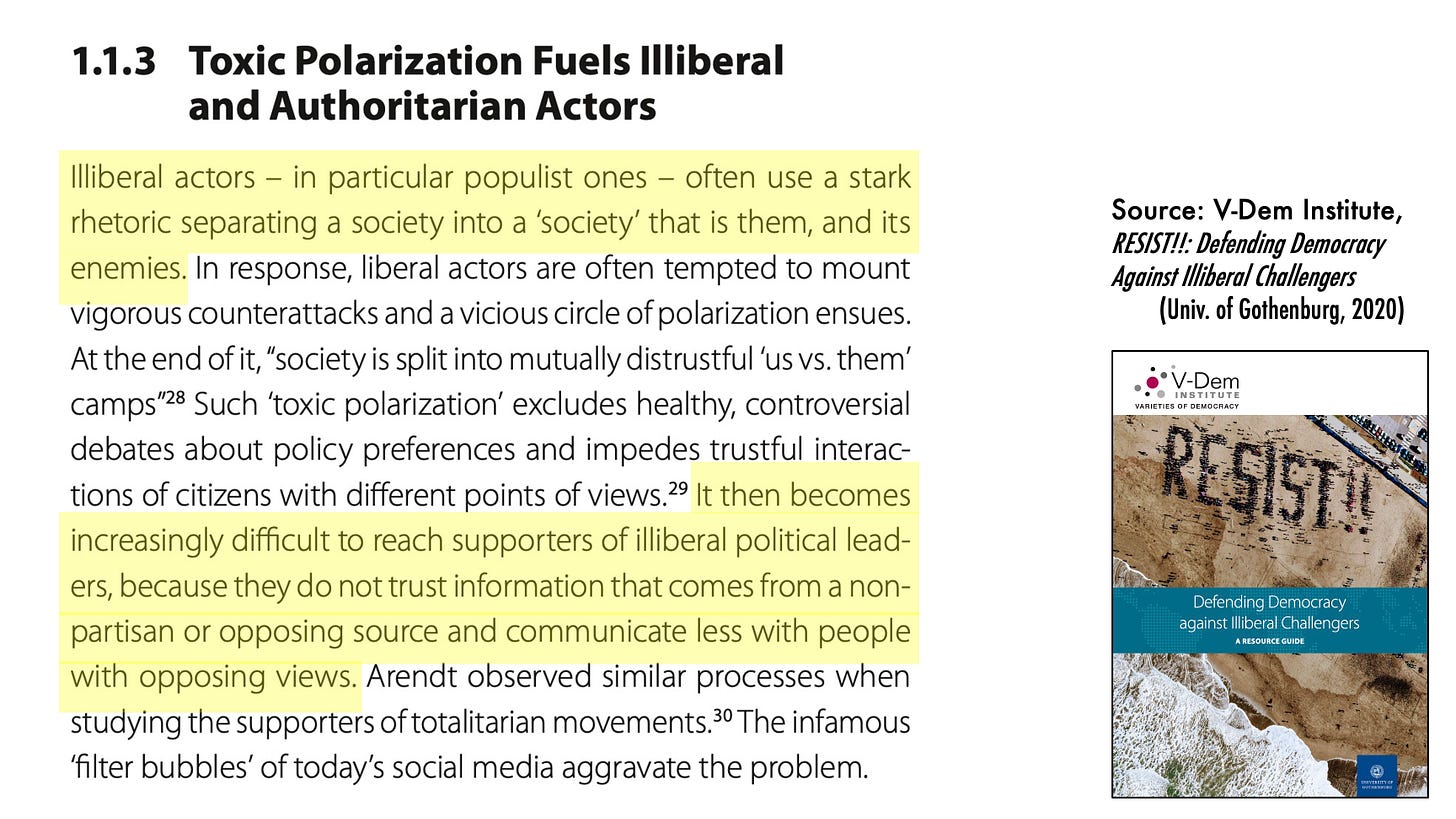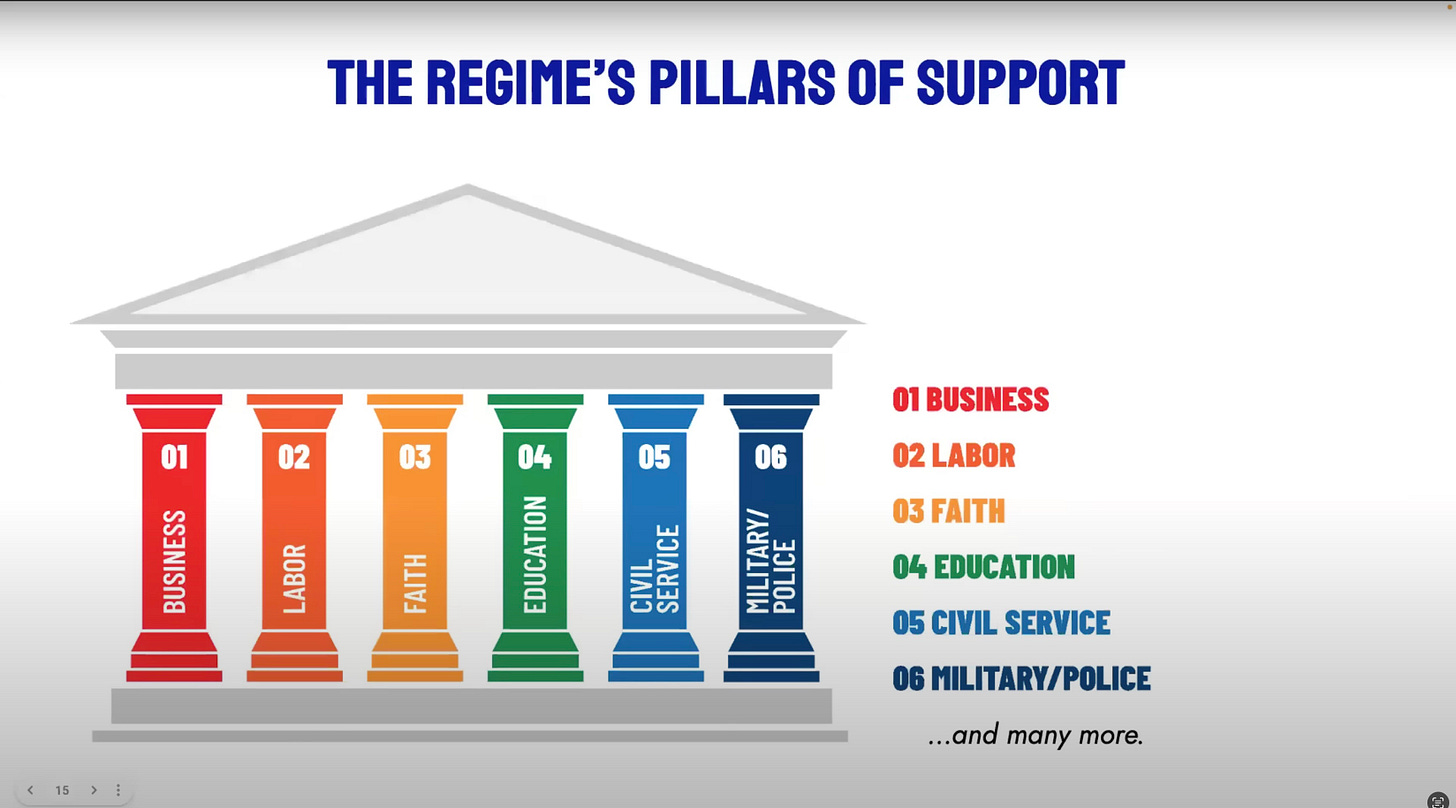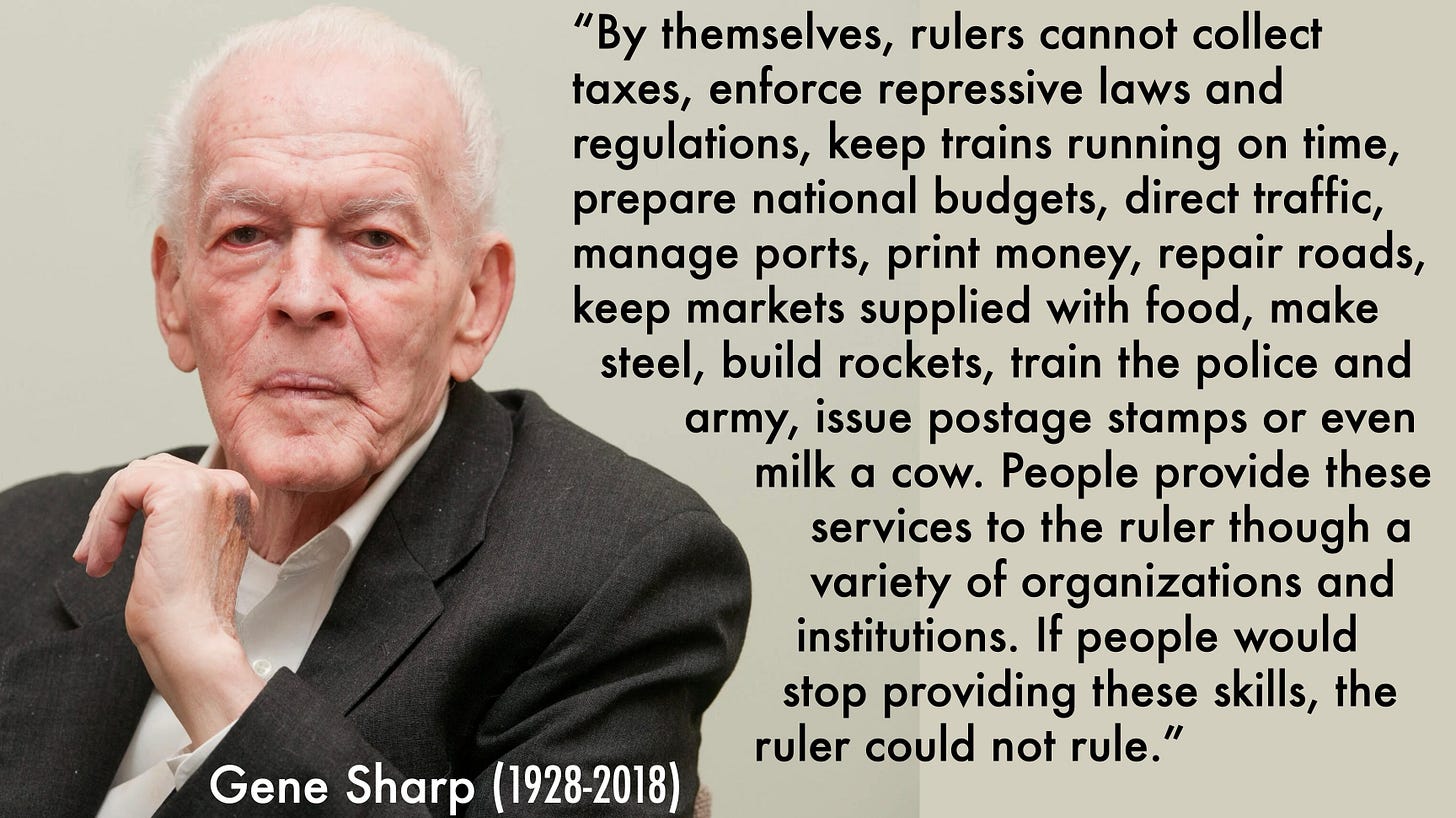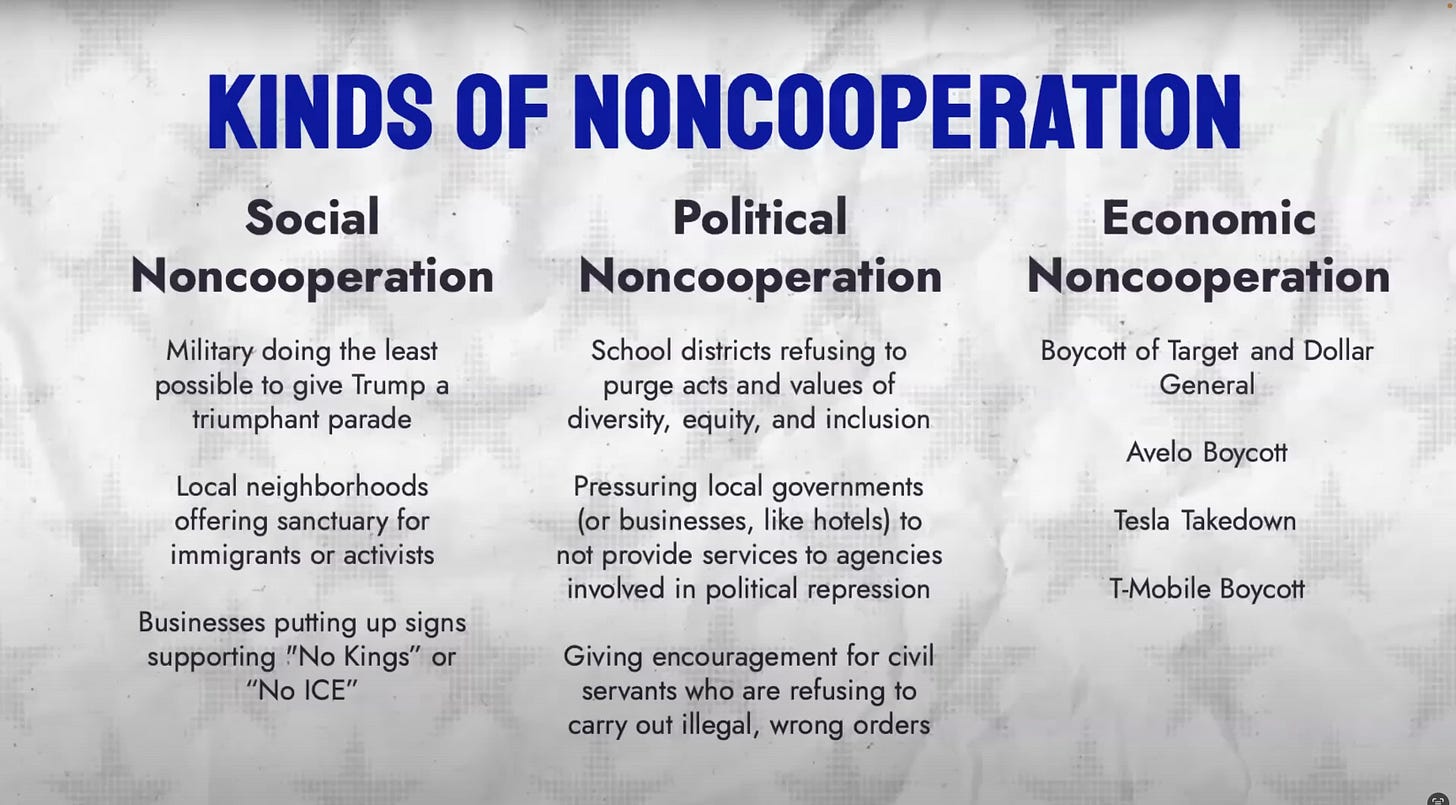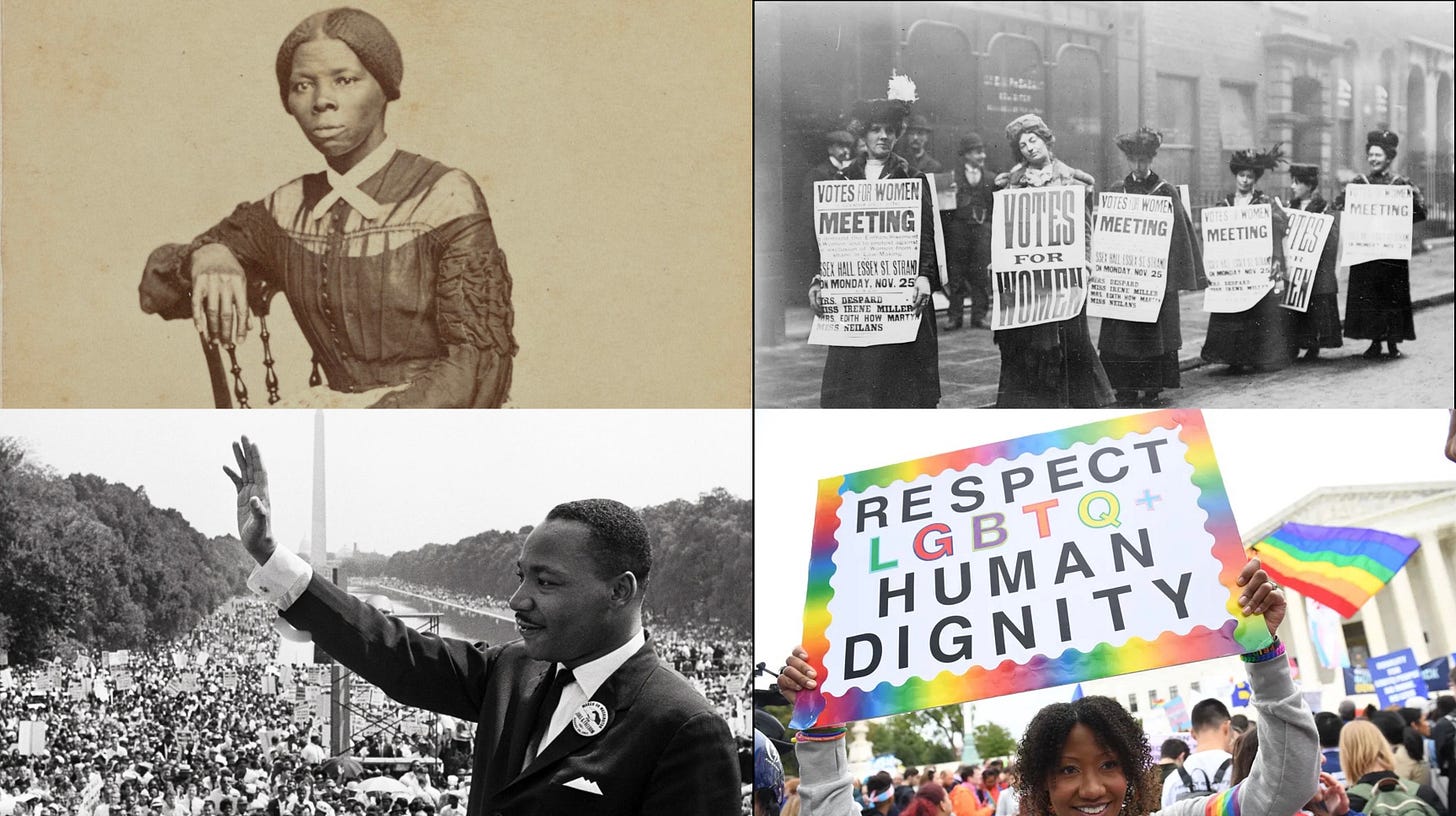Refusing, Together
How to Fight the Regime and Defend Democracy
Philip Nel’s remarks from last night’s Indivisible MHK meeting. Very lightly edited for Substack. After introducing the Indivisible movement, thanking outgoing chair Kaidy Smith (who has decided to step away from leadership) and thanking our IMHK Board (IMHK co-founder Christopher Renner, Savannah Lee, Julie Keenan, Amber Starling, and Jordy Sargent), I began —
Thank you for turning up tonight. We appreciate you being here.
And I just want to recognize that we’re all going through a lot right now. And some of us are going through much more than others. There are people in this room who, this year, have lost jobs, lost resources, lost sleep, lost friends, lost family or relationships with family members, lost stability, lost the future they thought they would be living in.
You may be feeling exhausted. Or anxious. Or afraid.
1: You are not alone
But, and this is the first of the three points I want to make, you are not alone. This is one reason why I thank you for turning up tonight. You are not alone. We are not alone. We are in this together. Look around this room, at the people who, on a humid Wednesday evening in late July, have turned up. This is what community looks like.
I’ve got more to say here, but first, just take a moment, introduce yourself to a neighbor. And if you already know the person you are sitting next to, then introduce your neighbor (and yourself) to someone you don’t know. What brings you both here tonight? How are you coping? What do you hope to get out of this evening’s meeting?
I say you are not alone because authoritarians want to divide us. Hannah Arendt famously observed that “Totalitarian government” depends upon isolating us from each other. “It bases itself on loneliness, on the experience of not belonging to the world at all.” But you are not alone. We are together.
I also say you are not alone because what Donald and his regime are doing is not popular. His job approval rating is now at 37%. Only 38% approve of his handling of immigration — that was supposed to be his signature issue. But it turns out that disappearing people is in fact not popular.
And I say you are not alone because autocracy is on the rise around the world. This is not a unique failure of the United States.
In 2004, 51% of the world’s population lived in democracies.
In 2024, 28% of the world’s population lived in democracies.
Source: V-Dem Institute, Democracy Report 2025
But, around the world, people are also fighting back against autocracy. We have allies around the world who we can learn from.
2: We are small-d democrats
One big lesson is that we have to find common ground with people we may disagree with. The way to defeat autocrats is a broad pro-democracy coalition. Indivisible is a small-d democratic organization. We are united by our shared belief in democracy.
I say this because if you supported Trump and now regret that vote, we welcome you. If you typically vote for Republicans but recognize the threat that Trump poses to our republic, we welcome you. We in Indivisible are democrats with a small d.
I also say this because the capital-D Democrats need to remember this, too. And so do people to the left of the capital-D Democrats. To beat authoritarianism, we must find common ground with others who support democracy, irrespective of party, irrespective of religious faith (or lack thereof), irrespective of class, level of education, race, gender, gender identity, sexual orientation, country of origin. And don’t get me wrong: These differences shape who we are and how experience the world. They are real differences.
But the goal here is restoring democracy. So, real though these differences are, we have to unite around our common cause. As Benjamin Franklin is alleged to have said (though probably did not say, but it’s a great quote), “We must all hang together or we shall all hang separately.”
Political polarization is dangerous. The University of Gothenburg’s V-Dem Project, which studies the varieties of democracy, finds that political polarization undermines democracy. Autocrats want to polarize us, to divide us, because—remember—they want to isolate us. So, we have to become unpolarized, we have to come together in support of democracy. This is not easy. But it’s what we have to do.
I also say we need to focus on small-d democracy because any large group of human beings is going to be messy, contentious, argumentative. This is especially true of groups of activists. After all, we believe passionately enough in an idea to take action!
On that note, our own Indivisible MHK has grown threefold since January of this year, and we are having elections for a new governing board — which (I hope) will include candidates from the current governing board and people not yet on the governing board. If you are interested and I hope you are interested, because we need all people who care about democracy, we have nomination forms — print versions, for those who prefer, and a Google form for those who prefer a digital version.
And please do consider this. I often think of all the people I’ve met since February who are doing things that they did not think they would be doing. Running for office — Amber Starling, Martha Sweeney, Courtney Jane Hochman, Rob Voelker. Doing semi-daily protests, in the heat, over at Westloop — and shifting in August to McCall Road, across from Freddys — thanks to John Thomas and Carl Reed and Lynn for their leadership! Making regular calls and visits to the offices of our alleged “representatives.” Hosting gatherings of community members. Doing all the behind-the-scenes work of organizing, registering the protest, creating the posters, getting the security together, all of it.
We live at a moment when we are called to do something. And so we have to rise to the occasion however we can.
3: So, what do we do?
So. How do we meet the challenges we face?
We are now in a period of autocratic breakthrough — a window in which the would-be authoritarian attempts to consolidate power and operate with impunity. The administration is often ignoring the courts, the Billionaire Bailout Bill is funding a massive secret police force. We’re in a more dangerous place.
So, though we will still protest and call, Indivisible is centering a new, larger mission — One Million Rising, and I’m drawing from the first One Million Rising Training here. The goal now is a nonviolent civil resistance movement that engages people across society, encouraging them to refuse to do what the regime expects, and to put pressure on the many pillars of society, encouraging them to refuse to do what the regime expects.
Because there are many pillars of society: Business, Labor, Faith, Education, Military, Police, and others. Workers can withhold their labor. Faith communities can refuse to allow their religion to be a tool of fascism. Civil servants can refuse to carry out illegal orders.1
Authoritarians are weaker than they appear. They depend upon the cowardice of Columbia University, the greed of CBS/Paramount, the obedience of law firms like Paul Weiss. They depend upon people and institutions volunteering their obedience.
But, as Gene Sharp says, “By themselves, rulers cannot collect taxes, enforce repressive laws and regulations, keep trains running on time, prepare national budgets, direct traffic, manage ports, print money, repair roads, keep markets supplied with food, make steel, build rockets, train the police and army, issue postage stamps or even milk a cow. People provide these services to the ruler though a variety of organizations and institutions. If people would stop providing these skills, the ruler could not rule.”
So, the strategy is non-violent civil resistance, sustained over time. Disrupt. Refuse to do what is expected of you. Do what is not expected of you. Put pressure on others not to cooperate.
The question for us is: What actions can we take here in Manhattan Kansas? How can we participate in this non-violent civil-resistance, sustained over time, of disruption, non-cooperation, and refusal? How can we build the structures of support that we will need to make this work? These are the questions we must answer, individually and together.
Because the future is not pre-determined. As Hannah Arendt also observed, “The main characteristic of any event is that it has not been foreseen.”
I’ll tell you something else I learned from people who study resistance movements: With a successful non-violent civil resistance movement, the country becomes more democratic as a result.
And this country has a rich history of organizing and fighting to expand who is included in our democracy. Let us learn from that history. Let us fight for a better country and a better world. Because a better world is possible. And we can build it. Together.
This paragraph is paraphrased from the first One Million Rising Training, at minute 46.




